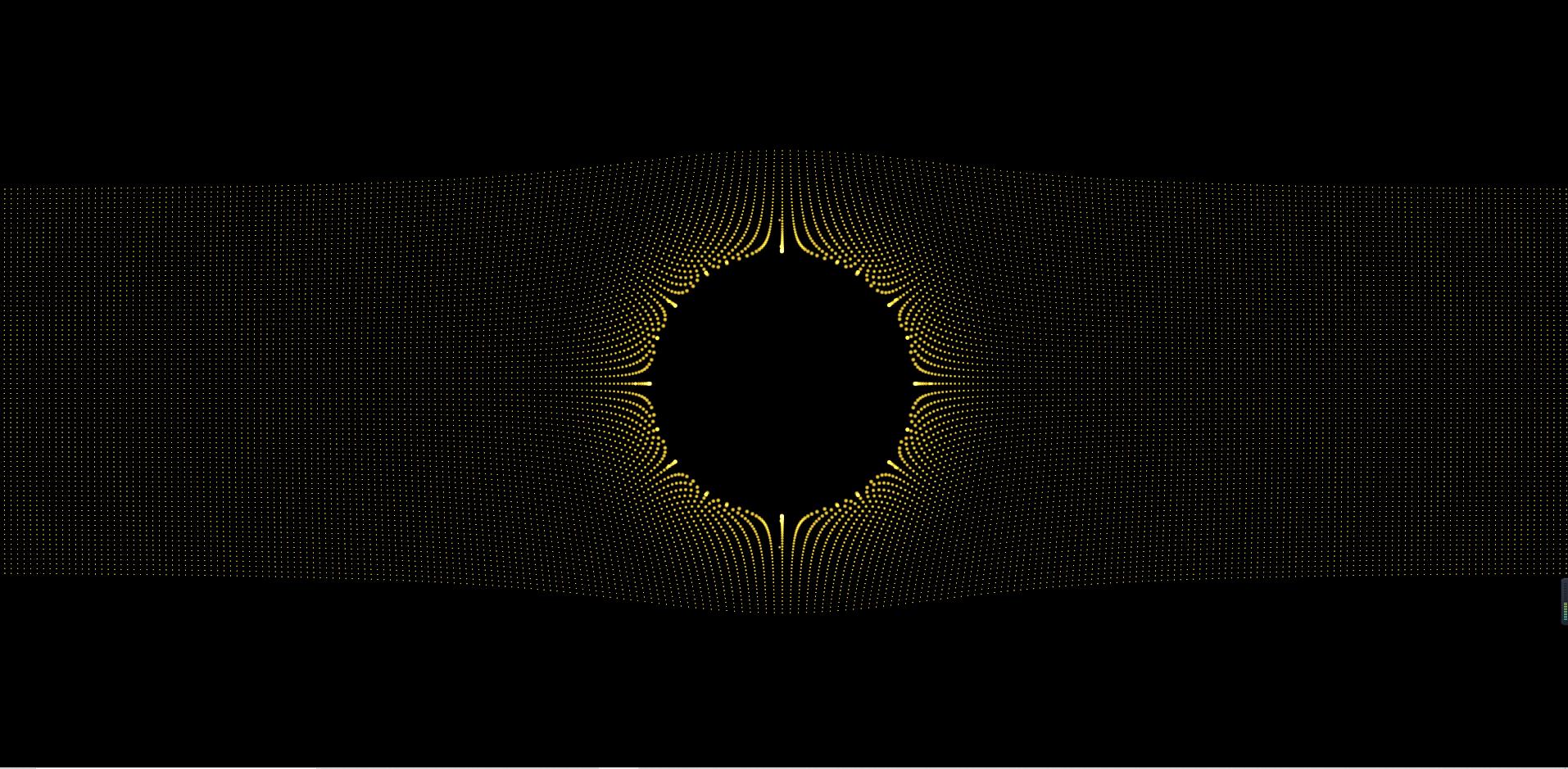十二HTML5鼠标经过粒子散开动画特效
Posted &小小白&
tags:
篇首语:本文由小常识网(cha138.com)小编为大家整理,主要介绍了十二HTML5鼠标经过粒子散开动画特效相关的知识,希望对你有一定的参考价值。
一、效果图

二、index.html源码
<!doctype html>
<html>
<head>
<meta charset="utf-8">
<title>HTML5鼠标经过粒子散开动画特效</title>
<style>
html, body {
position: absolute;
overflow: hidden;
margin: 0;
padding: 0;
width: 100%;
height: 100%;
background: #000000;
touch-action: none;
content-zooming: none;
}
canvas {
position: absolute;
width: 100%;
height: 100%;
background: #000000;
}
</style>
</head>
<body>
<canvas></canvas>
<script>
"use strict";
{
// particles class
class Particle {
constructor(k, i, j) {
this.i = i;
this.j = j;
this.init();
this.x = this.x0;
this.y = this.y0;
this.pos = posArray.subarray(k * 3, k * 3 + 3);
this.pointer = pointer;
}
init() {
this.x0 = canvas.width * 0.5 + this.i * canvas.width / 240;
this.y0 = canvas.height * 0.5 + this.j * canvas.height / 160;
}
move() {
const dx = this.pointer.x - this.x;
const dy = this.pointer.y - this.y;
const d = Math.sqrt(dx * dx + dy * dy);
const s = 1000 / d;
this.x += -s * (dx / d) + (this.x0 - this.x) * 0.02;
this.y += -s * (dy / d) + (this.y0 - this.y) * 0.02;
// update buffer position
this.pos[0] = this.x;
this.pos[1] = this.y;
this.pos[2] = 0.15 * s * s;
}
}
// webGL canvas
const canvas = {
init(options) {
// set webGL context
this.elem = document.querySelector("canvas");
const gl = (this.gl =
this.elem.getContext("webgl", options) ||
this.elem.getContext("experimental-webgl", options));
if (!gl) return false;
// compile shaders
const vertexShader = gl.createShader(gl.VERTEX_SHADER);
gl.shaderSource(
vertexShader,
`
precision highp float;
attribute vec3 aPosition;
uniform vec2 uResolution;
void main() {
gl_PointSize = max(2.0, min(30.0, aPosition.z));
gl_Position = vec4(
( aPosition.x / uResolution.x * 2.0) - 1.0,
(-aPosition.y / uResolution.y * 2.0) + 1.0,
0.0,
1.0
);
}
`
);
gl.compileShader(vertexShader);
const fragmentShader = gl.createShader(gl.FRAGMENT_SHADER);
gl.shaderSource(
fragmentShader,
`
precision highp float;
void main() {
vec2 pc = 2.0 * gl_PointCoord - 1.0;
gl_FragColor = vec4(1.0, 0.85, 0.25, 1.0 - dot(pc, pc));
}
`
);
gl.compileShader(fragmentShader);
const program = (this.program = gl.createProgram());
gl.attachShader(this.program, vertexShader);
gl.attachShader(this.program, fragmentShader);
gl.linkProgram(this.program);
gl.useProgram(this.program);
// resolution
this.uResolution = gl.getUniformLocation(this.program, "uResolution");
gl.enableVertexAttribArray(this.uResolution);
// canvas resize
this.resize();
window.addEventListener("resize", () => this.resize(), false);
return gl;
},
resize() {
this.width = this.elem.width = this.elem.offsetWidth;
this.height = this.elem.height = this.elem.offsetHeight;
for (const p of particles) p.init();
this.gl.uniform2f(this.uResolution, this.width, this.height);
this.gl.viewport(
0,
0,
this.gl.drawingBufferWidth,
this.gl.drawingBufferHeight
);
}
};
const pointer = {
init(canvas) {
this.x = 0.1 + canvas.width * 0.5;
this.y = canvas.height * 0.5;
this.s = 0;
["mousemove", "touchstart", "touchmove"].forEach((event, touch) => {
document.addEventListener(
event,
e => {
if (touch) {
e.preventDefault();
this.x = e.targetTouches[0].clientX;
this.y = e.targetTouches[0].clientY;
} else {
this.x = e.clientX;
this.y = e.clientY;
}
},
false
);
});
}
};
// init webGL canvas
const particles = [];
const gl = canvas.init({
alpha: false,
stencil: true,
antialias: true,
depth: false
});
// additive blending "lighter"
gl.blendFunc(gl.SRC_ALPHA, gl.ONE);
gl.enable(gl.BLEND);
// init pointer
pointer.init(canvas);
// init particles
const nParticles = 240 * 80;
const posArray = new Float32Array(nParticles * 3);
let k = 0;
for (let i = -120; i < 120; i++) {
for (let j = -40; j < 40; j++) {
particles.push(new Particle(k++, i, j));
}
}
// create position buffer
const aPosition = gl.getAttribLocation(canvas.program, "aPosition");
gl.enableVertexAttribArray(aPosition);
const positionBuffer = gl.createBuffer();
// draw all particles
const draw = () => {
gl.bindBuffer(gl.ARRAY_BUFFER, positionBuffer);
gl.vertexAttribPointer(aPosition, 3, gl.FLOAT, false, 0, 0);
gl.bufferData(
gl.ARRAY_BUFFER,
posArray,
gl.DYNAMIC_DRAW
);
gl.drawArrays(gl.GL_POINTS, 0, nParticles);
}
// main animation loop
const run = () => {
requestAnimationFrame(run);
for (const p of particles) p.move();
draw();
};
requestAnimationFrame(run);
}
</script>
<div style="text-align:center;margin:50px 0; font:normal 14px/24px 'MicroSoft YaHei';"></div>
</body>
</html>
以上是关于十二HTML5鼠标经过粒子散开动画特效的主要内容,如果未能解决你的问题,请参考以下文章